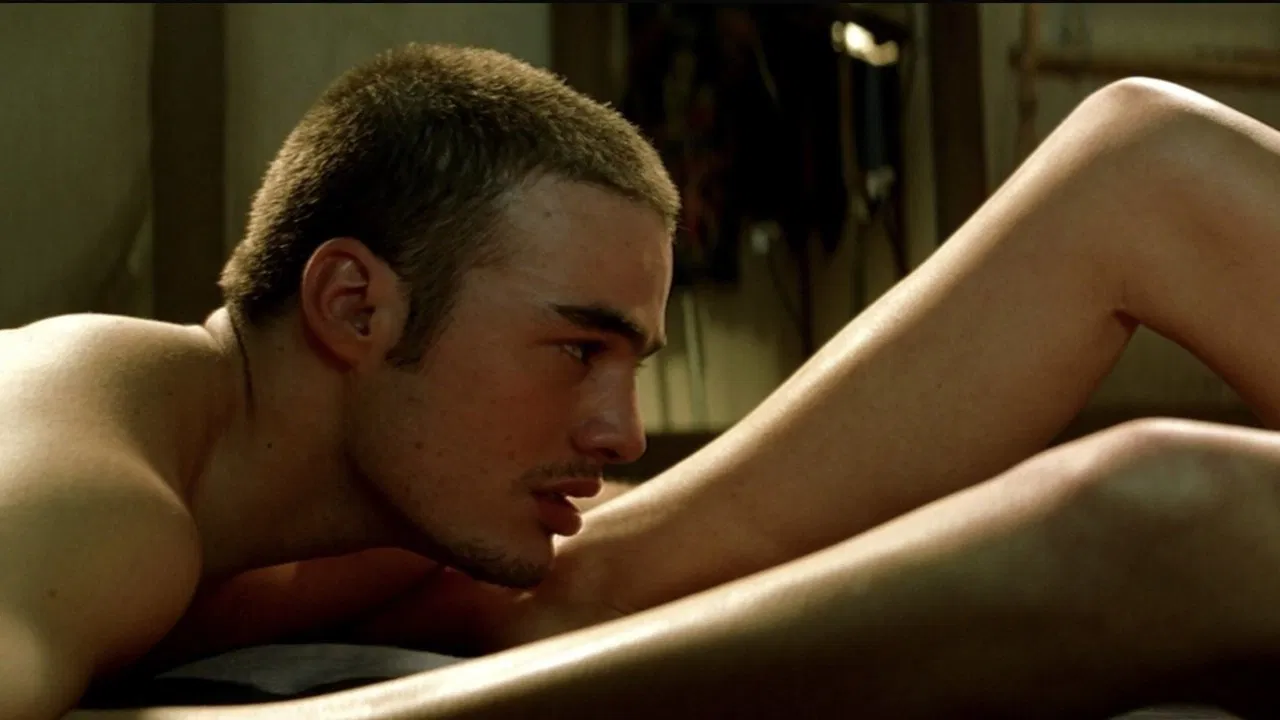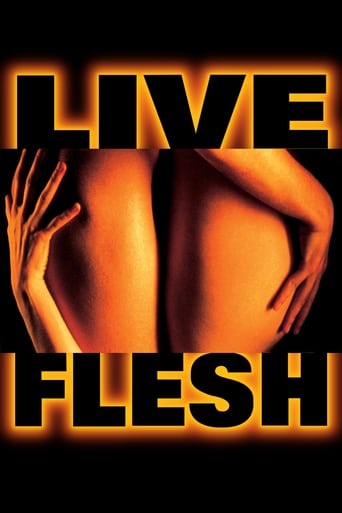

Watching any film by Pedro Almodóvar is an enriching experience, an experience that teaches the viewers some new things about cinema and some new things about life. Live Flesh ("Carne tremula" in Spanish) is not exception. It is a film about passion and desire, it is a melodrama that makes more sense than life itself, it presents five characters whom we get to know by the end of the film better than our own family.The story has one prologue, one first chapter taking place twenty years later, more chapters in the contemporaneity (meaning 1997) and a prologue a few months later. A young woman (only appearance in this movie as a live person by Penélope Cruz) gives birth, it's the sleepy Madrid at the end of the Franco era, still a policy state, still hard to catch a taxi even if the streets at night are empty, so the birth takes place in a semi-hijacked bus. Twenty years later in bustling democratic Madrid two cops are called to a place where a young 20 years old pizza delivery boy (yes, that boy) has an altercation with a beautiful young prostitute. Shots are being fired, and one of the policemen is hurt and becomes crippled, not before drawing the attention of the young woman. A few years later the boy gets out of jail and plans to revenge the policeman who stole his youth. His revenge involves not only the woman but also the wife of the other cop. We are in full Almodovar melodrama, everybody is in love or makes sex with everybody else, it's not a romantic triangle but a love and passion pentagon. All funny and sexy, violent and endearingThe songs of Chavela Valdez inspired part of the story and the approach of Almodóvar. As in many other of his films he makes no moral judgment about the actions of his characters, but we feel that he cares about them all, and would like to make us care too. Although it's a mix of comedy and melodrama 'Live Flesh' never goes where we expect, because the director and story teller does not run away from mixing the beautiful and tend with the ugly and cruel aspects of life. Javier Bardem performs here in one of the best roles of his early career, and the rest of the team including Liberto Rabal, Francesca Neri, and Ángela Molina define each their characters, each of them with his or her own passion and aspiration to love. Although it is hazard that seems to trigger many of the events, the ending provides a fulfilling sensation. The divinity (I mean, of course, the film director) takes care of everything.
... View MoreThis Pedro Almodovar movie was the second film – after The Flower of My Secret – where he toned things down and went for a more serious approach. Having said that, it's still very much a melodrama. Its story is simultaneously simple and complex. It basically is about how one gunshot changes the lives of five people. It starts out appearing one way but as we get to know the participants we discover their differing motivations on that fateful night. Everyone seems to be suffering because of the actions of another. Every character is a shade of grey, no one is innocent and the film is about guilt and redemption as much as anything. Once you think back on the story you only then realise how complex a web of deceit and betrayal has been woven by all of the participants. Some have also mentioned that it is an allegorical story about Spain's recent history. While there is an interesting opening segment set in 1970 in Franco's regime, I honestly couldn't tell you what the allegory actually is. Maybe it's a cultural thing or perhaps I'm just too dumb to have noticed. But regardless of this, Live Flesh can easily be appreciated without this.
... View MoreIf with LA FLOR DE MI SECRETO Pedro Almodovar seemed to tell the world he was done with his garish style and was ready to explore more mature themes. While not many people were happy with his decision, it was inevitable: sooner or later every director has to make a choice and explore less traveled paths with the risk of failing or succeeding. Almodovar's next project, a Ruth Rendell novel called "Live Flesh", was as removed from his trademark style as it was dark: an incursion into the crime genre that explored the nature of intertwined destinies locked in a prolonged dance of seduction, consuming passions, death, and ultimate redemption, neatly presented as a clichéd love quadrangle. While the events of CARNE TREMULA can't be taken as serious, being the elements of every other pot-boiler drenched in atmosphere and melodramatic suspense, Almodovar has that extra touch that differentiates him from the mass. He transposes Rendell's sordid story into a conflicted country and imbues the story's passions with a very Spanish flavour: truthfully, this is the first movie in which the masculine is a driving force and women are subjugated into "being there" and acting upon request. A classic example of masculine energy acting upon its nature is a scene in which Javier Bardem and Liberto Rabal, antagonists competing for the love of a woman (Francesca Neri), exchange blows... but pause to watch their country's soccer team score, only to resume their positions of alpha males warring against each other. But more significantly, masculine passion plays a much more profound aspect in driving the events of CARNE TREMULA in the scene where detective Bardem and his partner Jose Sancho arrive to respond to a crime scene (which involves Neri and Rabal) while being in the middle of a misunderstanding. Sancho believes Bardem is having an affair with his wife, played by Angela Molina (she of Luis Bunuel's THAT OBSCURE OBJECT OF DESIRE). When they break into Neri's apartment (after a gun goes off while Neri's television plays a key scene in Luis Bunuel's ENSAYO DE UN CRIMEN -- a brilliant combination of life imitating the sordid), Sancho and Bardem bring Rabal into submission, but Sancho decides to use that moment to fire the fateful shot against his own partner and lay the blame on Rabal. From then on, it's a game between these three men who will be tied together by this very scene and will be, like the characters in Bunuel's own 1955 classic, doomed to clash again, with disastrous results. In many ways, CARNE TREMULA can be interpreted as a clash of bulls fighting for the infanta whom they love (or believe they love) and is a welcome departure from his more female-oriented melodramas.
... View MorePedro Aldomovar is seen as a real genius and personally I think that one film is better than the other but this movie from 1997 certainly belong to the best the Spanish infant terrible has made. In 1970 a woman bears a child in a bus and it's that boy, Victor (Liberto Rabal), who we are going to follow. Victor is an ordinary guy but due to circumstances his whole life will be twisted up as he's the victim from two policemen who are arguing. Like so many other movies by Aldomovar it would be a real spoiler to reveal things as the magic of the movie is to be found in its surprising storytelling that at first doesn't make that much sense but develops itself into a perfect, surprising story. Aldomovar is becoming the master of telling the little things in life and it's in that we can found so much beauty. Also nice to see Penelope Cruz as special guest star, even if she's in it for about 5 minutes. "Live Flesh" certainly is one of Aldomovar's easier movies as for once he gives all the answer even if you have to wait till the end of the movie. A tip!
... View More